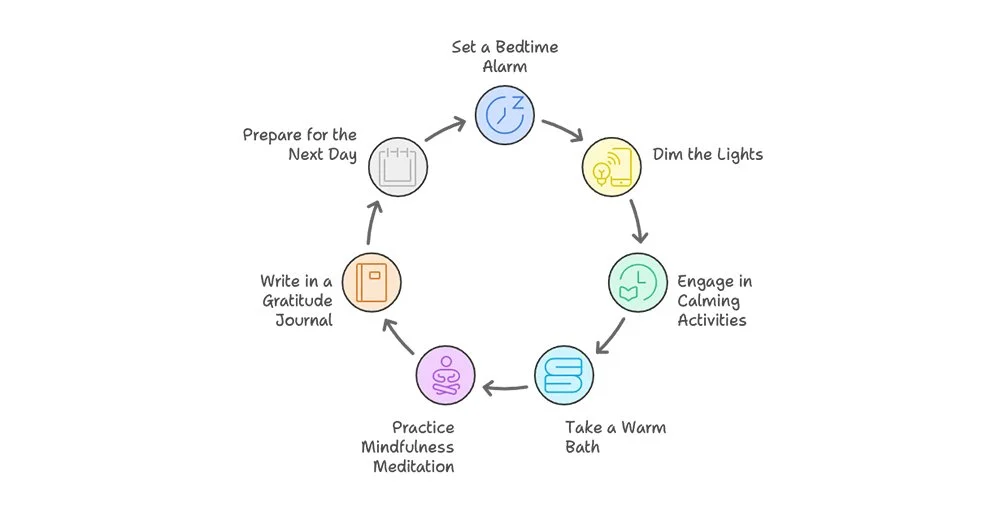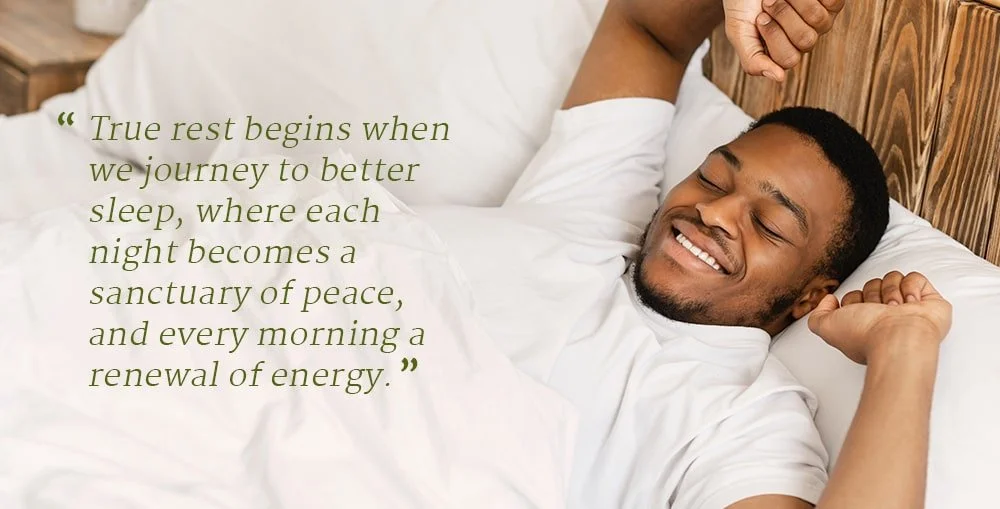Unlock Better Sleep with Mindfulness Meditation Tips
Table of Contents Show
Quick Summary
Are you tossing and turning at night, your mind racing with thoughts of tomorrow's to-do list? This article explores how mindfulness meditation can be your key to unlocking better sleep. We take a look into the intricate relationship between stress and sleep, uncovering how mindfulness practices can break this cycle.
Learn practical meditation techniques, discover how to create a sleep-friendly environment, and develop a relaxing bedtime routine. We'll also explore daytime habits that promote better sleep and advanced relaxation methods. Whether you're a meditation novice or looking to deepen your practice, find your path to restful nights and energized days through mindfulness.
In today's fast-paced world, a good night's sleep has become an elusive dream for many.
From professionals juggling demanding careers to students burning the midnight oil, more and more people find themselves tossing and turning when they should be resting and recharging.
But what if the key to unlocking better sleep was already within you, waiting to be discovered?
At West End Wellness, we've seen firsthand how the relentless pace of modern life can affect our sleep patterns.
The constant ping of notifications, the pressure to keep up with an always-on culture, and the accumulating stress of daily life all add up to nights of restless sleep and days of foggy fatigue.
Yet, amidst the chaos of our daily lives, mindfulness meditation is a powerful tool that can help us reclaim our nights and revitalize our days.
This article is your guide to harnessing the power of mindfulness for better sleep.
We'll explore how this ancient practice, backed by modern science, can help you quiet the mental chatter that keeps you awake, reduce the stress that tenses your muscles, and create a peaceful oasis in your mind – even when the world around you seems never to slow down.
Whether you're a seasoned meditator looking to deepen your practice or a curious beginner wondering how sitting still can help you sleep, you'll find practical tips, science-backed insights, and a path to the restful nights you've been dreaming of.
So, take a deep breath, let the tension in your shoulders melt away, and join us to discover how mindfulness meditation can transform your sleep – and your life.
It's time to unlock the door to better sleep and enter a world of renewed energy and clarity.
Understanding Your Sleep-Stress Cycle
Let us imagine or recognize this scenario: you're lying in bed, eyes wide open, watching the minutes tick by on your alarm clock. Your mind is racing, replaying the day's events or worrying about tomorrow's to-do list. Does this sound familiar?
You're not alone. This scenario is a classic example of the sleep-stress cycle in action. Believe it or not, there is a science to sleep.
The Vicious Cycle of Stress and Sleep
Stress and sleep are locked in a complex dance, each influencing the other in ways that can feel impossible to untangle. Here's how it typically plays out:
Stress keeps you awake: When you're stressed, your body releases cortisol, the "fight or flight" hormone. This heightened state of alertness is great for dealing with immediate threats, but not so great for drifting off to sleep.
Lack of sleep increases stress: After a poor night's sleep, your body produces even more cortisol, making you more reactive to stressors the next day. It's like your stress threshold has been lowered, making everything feel more overwhelming.
The cycle continues: As stress builds and sleep suffers, the cycle perpetuates itself, potentially leading to chronic insomnia and heightened anxiety over time.
The Role of Cortisol and Melatonin
Understanding two key players in this cycle – cortisol and melatonin – can help you see why stress and sleep are so intertwined:
Cortisol: Often called the "stress hormone," cortisol typically follows a daily rhythm. It should be highest in the morning to help you wake up and lowest at night. However, chronic stress can disrupt this pattern, leading to high cortisol levels at bedtime.
Melatonin: Known as the "sleep hormone," melatonin is naturally produced by your body in response to darkness. It helps regulate your sleep-wake cycle. Stress, along with factors like blue light exposure from screens, can suppress melatonin production, making it harder to fall asleep.
Signs That Stress Is Impacting Your Sleep
How do you know if stress is behind your sleep troubles? Look out for these signs:
Difficulty falling asleep, even when you feel tired
Waking up frequently during the night
Waking up feeling unrefreshed, even after a full night's sleep
Increased irritability or mood swings during the day
Difficulty concentrating or remembering things
Physical symptoms like headaches or muscle tension
Recognizing these signs is the first step towards breaking the sleep-stress cycle.
In the next section, we'll explore how mindfulness meditation can effectively interrupt this cycle, helping you find your way back to restful nights and calmer days.
Remember, understanding the sleep-stress cycle doesn't mean you're powerless against it. Knowledge is power, and with the right tools – like the mindfulness techniques we'll discuss next – you can regain control over your stress levels and your sleep quality.
We all have to start somewhere right? So take a moment to find out about how you can begin your journey and the benefits of mindfulness with meditation.
Mindfulness Meditation: What is Mindfulness Meditation?
Mindfulness meditation emerges as a powerful ally in our quest for better sleep. This ancient practice, now backed by modern science, offers a natural and effective way to break the sleep-stress cycle and lead to more restful nights.
At its core, mindfulness meditation is the practice of being fully present in the moment and aware of your thoughts and feelings without judgment. It's about observing your mind and body, accepting what you find, and gently redirecting your attention when it wanders.
For sleep, this means learning to quiet the mental chatter that often keeps us awake, reducing the physical tension that stress builds in our bodies, and creating a sense of calm that invites sleep.
Benefits for Stress Reduction and Sleep Improvement
Research has shown that regular mindfulness practice can have significant benefits for both stress management and sleep quality:
Reduces cortisol levels, helping to break the stress-sleep cycle
Increases melatonin production, promoting natural sleepiness
Improves sleep quality and duration
Reduces symptoms of insomnia and sleep disturbances
Lowers anxiety and racing thoughts at bedtime
Enhances overall well-being and daytime functioning
Simple Mindfulness Exercises to Try Tonight
Ready to give mindfulness a try? Here are three simple exercises you can practice tonight as you prepare for sleep:
Body Scan Meditation: Start at your toes and slowly move your attention up through your body, noticing any sensations or tension. As you reach each part of your body, consciously relax those muscles. This helps release physical stress and prepares your body for sleep.
Breath Awareness: Focus your attention on your breath. Notice the sensation of air moving in and out of your body. When your mind wanders (and it will), gently bring your focus back to your breath. This simple practice can quiet a busy mind and induce relaxation.
Gratitude Meditation: As you lie in bed, think of three things you're grateful for from your day. They can be big or small. This positive focus can help shift your mind from stressors and create a more peaceful sleep state.
Remember, mindfulness is a skill that improves with practice. Don't get discouraged if your mind wanders or if you don't feel an immediate effect. The key is consistency and patience.
Creating a Sleep-Friendly Environment
Your bedroom environment plays a crucial role in promoting quality sleep. By optimizing your sleep space, you can enhance the effectiveness of your mindfulness practice and set the stage for more restful nights.
Optimize Your Bedroom for Restful Sleep
Temperature: Keep your bedroom cool, ideally between 60-67°F (15 and 19°C). A slight drop in body temperature can trigger sleepiness.
Darkness: Use blackout curtains or an eye mask to block out light. Darkness stimulates melatonin production, signalling your body that it's time to sleep.
Quiet: If outside noise is an issue, consider using a white noise machine or earplugs to create a quiet environment.
Comfort: Invest in a supportive mattress and comfortable pillows. Your bed should be a haven for relaxation.
The Impact of Light on Sleep Quality
Natural Light: Expose yourself to natural daylight, especially in the morning. This helps regulate your circadian rhythm.
Artificial Light: Limit exposure to blue light from screens at least an hour before bedtime. Blue light can suppress melatonin production, making it harder to fall asleep.
Nightlights: If you need a nightlight, opt for one with a red bulb. Red light has the least impact on melatonin production.
Creating a Tech-Free Zone
Digital Detox: Make your bedroom a tech-free zone. Remove TVs, computers, and phones from your sleep space.
Charge Elsewhere: Charge your devices in another room to avoid the temptation of late-night scrolling.
Wind-Down Time: Establish a digital curfew an hour before bed. Use this time for relaxing activities like reading or gentle stretching.
Aromatherapy for Sleep
Certain scents can promote relaxation and improve sleep quality. Consider incorporating these sleep-friendly aromas into your bedroom:
Lavender: Known for its calming properties, lavender can reduce anxiety and improve sleep quality.
Chamomile: This herb is traditionally used to promote relaxation and sleepiness.
Vanilla: The sweet scent of vanilla can lower stress levels and create a sense of calm.
Use essential oils in a diffuser, lightly spritz your pillow, or apply diluted oils to your skin before bed. By creating a sleep sanctuary in your bedroom, you're setting the stage for better sleep.
Combined with mindfulness techniques, these environmental adjustments can significantly improve your sleep quality, helping you wake up refreshed and ready to face the day.
The Power of Consistency in Sleep Hygiene
A consistent bedtime routine signals to your body that it's time to wind down, making the transition to sleep smoother and more natural. By incorporating mindfulness and relaxation techniques into your nightly ritual, you can set the stage for restful sleep.
Our bodies thrive on routine. You reinforce your natural sleep-wake cycle by going to bed and waking up at the same time every day, even on weekends.
This consistency helps regulate your body's internal clock, making it easier to fall asleep and wake up naturally.
Steps for a Stress-Reducing Nighttime Ritual
Set a bedtime alarm: Just as you set an alarm to wake up, set one to remind you when it's time to start winding down. This helps you stick to a consistent sleep schedule.
Dim the lights: About an hour before bed, start lowering the lights in your home. This subtle change signals to your body that it's time to produce melatonin, the sleep hormone.
Engage in calming activities: Choose relaxing activities like reading a book, listening to soothing music, or practicing gentle yoga. Avoid stimulating activities or conversations that might elevate stress levels.
Take a warm bath or shower: A warm bath or shower can relax your muscles and slightly lower your body temperature, promoting sleepiness.
Practice mindfulness meditation Incorporate a short mindfulness session into your routine. Even 5-10 minutes can help calm your mind and prepare you for sleep.
Write in a gratitude journal: Jot down three things for which you're grateful. This positive focus can help shift your mind away from stressors and promote a sense of well-being.
Prepare for the next day: Spend a few minutes organizing for tomorrow. This can help prevent middle-of-the-night worry about pending tasks.
Incorporating Aromatherapy and Relaxation Techniques
Aromatherapy: Use calming scents like lavender or chamomile in a diffuser or as part of your skincare routine.
Progressive Muscle Relaxation: Start from your toes and move up to your head, tense, and then relax each muscle group. This helps release the physical tension accumulated during the day.
Visualization: Imagine a detailed, peaceful, calming scene. Engage all your senses in this mental image to help shift your focus away from daily stressors.
Remember, the key to a successful bedtime routine is consistency. It may take some time for your body to adjust, but with patience and persistence, you can train your mind and body to welcome sleep more easily each night.
Daytime Habits for Nighttime Peace
What you do during the day significantly impacts your sleep quality at night. Healthy daytime habits can set the stage for better sleep and reduced stress levels.
Exercise and Its Impact on Sleep Quality
Regular physical activity can improve sleep quality and duration. Aim for at least 30 minutes of moderate exercise most days of the week. However, timing matters:
Morning or afternoon exercise can help regulate your sleep-wake cycle. Avoid vigorous exercise close to bedtime, as it may be too stimulating. Gentle exercises like yoga or stretching can be beneficial in the evening.
Nutrition Tips for Better Sleep
What you eat and drink can affect your sleep:
Limit caffeine intake, especially in the afternoon and evening.
Avoid large meals close to bedtime.
Stay hydrated throughout the day, but reduce fluid intake before bed.
Consider sleep-promoting foods like cherries, bananas, or herbal teas.
Managing Daytime Stress for Improved Nights
Incorporate stress-management techniques into your daily routine:
Practice mindfulness or meditation during your lunch break. Take short breaks throughout the day to stretch or do deep breathing exercises.
Use stress-management apps for quick relaxation sessions.
Engage in hobbies or activities you enjoy to reduce overall stress levels.
By mindfully managing your daytime habits, you're laying the groundwork for more restful nights and creating a positive cycle of better sleep and reduced stress.
Advanced Relaxation Techniques
As you become more comfortable with basic mindfulness practices, you may want to explore more advanced techniques to deepen your relaxation and improve your sleep quality.
-
Guided imagery involves using your imagination to create a mental experience that promotes relaxation:
Choose a peaceful, calming scene (e.g., a beach, Cascade Falls, or Dog Mountaintop).
Engage all your senses in imagining this place. What do you see, hear, smell, and feel? Immerse yourself in this mental image, allowing stress and tension to melt away. You can use recorded guided imagery sessions or create your own mental scenes.
-
Progressive Muscle Relaxation (PMR) involves tensing and then relaxing different muscle groups in sequence. This technique can help you become more aware of physical tension and release it effectively.
Start in a comfortable position, either sitting or lying down.
Beginning with your toes, tense the muscles as tightly as you can for 5 seconds.
Release the tension suddenly and feel the muscles relax for 10-15 seconds.
Move progressively through each muscle group: feet, calves, thighs, hips, abdomen, chest, fingers, arms, shoulders, neck, and face.
-
Deep breathing exercises can quickly activate your body's relaxation response:
4-7-8 Breathing: Inhale for 4 counts, hold for 7 counts, exhale for 8 counts.
Box Breathing: Inhale for 4 counts, hold for 4 counts, exhale for 4 counts, hold for 4 counts.
Diaphragmatic Breathing: Place one hand on your chest and the other on your belly. Breathe deeply so that your belly hand rises more than your chest hand.
These advanced techniques offer powerful tools for deepening your relaxation practice and enhancing your sleep quality. Experiment with different methods to find what works best for you, and remember that like any skill, these techniques improve with regular practice.
When Mindfulness Isn't Enough: Signs It's Time to Consult a Professional Help
While mindfulness meditation and lifestyle changes can significantly improve sleep quality for many, some individuals may need additional support. If you've consistently applied the techniques we've discussed and still struggle with sleep, it might be time to consider professional help.
Look out for these persistent symptoms:
Chronic insomnia (difficulty falling asleep or staying asleep)
Persistent daytime fatigue despite adequate sleep time
Loud snoring or gasping during sleep (potential signs of sleep apnea)
Restless leg syndrome or periodic limb movements during sleep
Narcolepsy symptoms (sudden sleep attacks during the day)
If you experience any of these symptoms regularly, consult a healthcare professional or sleep specialist for a thorough evaluation.
In addition to traditional medical approaches, complementary therapies can significantly improve sleep quality. Two particularly effective options are acupuncture and Registered Massage Therapy (RMT).
Acupuncture for Better Sleep
Acupuncture has been shown to have a positive impact on sleep quality. This ancient Chinese practice involves inserting thin needles into specific points on the body to promote healing and relaxation. Acupuncture can help:
Regulate the body's circadian rhythm
Increase the production of sleep-promoting neurotransmitters
Reduce anxiety and stress, common culprits of sleep disturbances
To learn more about how acupuncture can improve your sleep, read our detailed article on How Acupuncture Can Help To Improve Sleep Quality.
Registered Massage Therapy (RMT) for Sleep Enhancement
Registered Massage Therapy is another powerful tool for improving sleep quality. RMT can:
Reduce muscle tension and physical stress
Promote relaxation and calmness
Increase serotonin levels, which is crucial for sleep regulation
Regular massage sessions can complement your mindfulness practice, helping to create a more relaxed state conducive to better sleep.
Discover the benefits of RMT for sleep in our article on The Connection Between RMT and Improved Sleep Quality.
Cognitive Behavioral Therapy for Insomnia (CBT-I)
For persistent sleep issues, Cognitive Behavioral Therapy for Insomnia (CBT-I) is considered the gold standard treatment. CBT-I is a structured program that helps you:
Identify and replace thoughts and behaviours that cause or worsen sleep problems
Develop habits that promote sound sleep
Learn techniques to reduce sleep-related anxiety
Remember, seeking professional help is not a sign of failure but a proactive step towards better health and well-being.
At West End Wellness, we offer a range of services, including Acupuncture and RMT, and we can provide referrals to sleep specialists when needed. Your journey to better sleep is unique, and we're here to support you every step of the way.
Recapping Our Journey to Better Sleep
As we wrap up our exploration of mindfulness meditation for better sleep, it's clear that the path to restful nights is multifaceted.
We've journeyed through the intricate dance between stress and sleep, uncovering how mindfulness can be a powerful tool in breaking this cycle and paving the way for more restorative rest.
Key Takeaways for Your Sleep Toolkit
Understand the sleep-stress cycle: Recognizing how stress impacts your sleep is the first step towards improvement.
Practice mindfulness regularly. Even a few minutes of daily meditation can significantly improve your sleep quality.
Create a sleep-friendly environment: Your bedroom should be a sanctuary for rest, free from distractions and conducive to relaxation.
Develop a consistent bedtime routine: A calming pre-sleep ritual signals to your body that it's time to wind down.
Mind your daytime habits: What you do during the day, from exercise to nutrition, plays a crucial role in nighttime rest.
Explore advanced relaxation techniques: As you become more comfortable with basic mindfulness, try progressive muscle relaxation or guided imagery for more profound relaxation.
Remember, the journey to better sleep is personal and unique.
What works for one person may not work for another.
We encourage you to experiment with the techniques we've discussed, giving yourself time to find what resonates best with you.
If sleep continues to elude you despite your best efforts, don't hesitate to seek professional help. At West End Wellness, we understand the importance of quality sleep to overall health and well-being.
Our team of experienced practitioners, including registered massage therapists and acupuncturists, is here to support you on your path to better sleep.
Whether through mindfulness practices, lifestyle adjustments, or professional treatments, know that improved sleep is within reach. Sweet dreams await you on the other side of your sleep improvement journey.
If you have any further doubts or questions regarding this subject or another treatment, contact one of our experienced Acupuncturists or Registered Massage Therapists here at West End Wellness Clinic. You can either give us a call or make an appointment.
Disclaimer: Please remember this article is for informational purposes only and should not replace professional medical advice. Please consult a healthcare provider or someone with the correct qualifications before starting any new exercise or treatment program.







